How do I know if my soil is compacted enough? - HENGDA RIC
- Update time:2023-01-28 15:36:11
- Views:316
The RIC technology is the modern approach for compacting existing soils that would otherwise be excavated and compacted using a conventional roller compactor in layers of 15 to 30cm.
Energy is transferred to the underlying loose granular soils rearranging the particles into a denser formation. RIC can effectively densify up to 4-5m of soils without excavation, adding water or dewatering. It can also be used for fill compaction, which can place in bulk fill materials and compact it accordingly without adding any water.
For large infrastructure developments, RIC takes the lead due to its speed of execution that makes it much more cost effective than other alternatives.
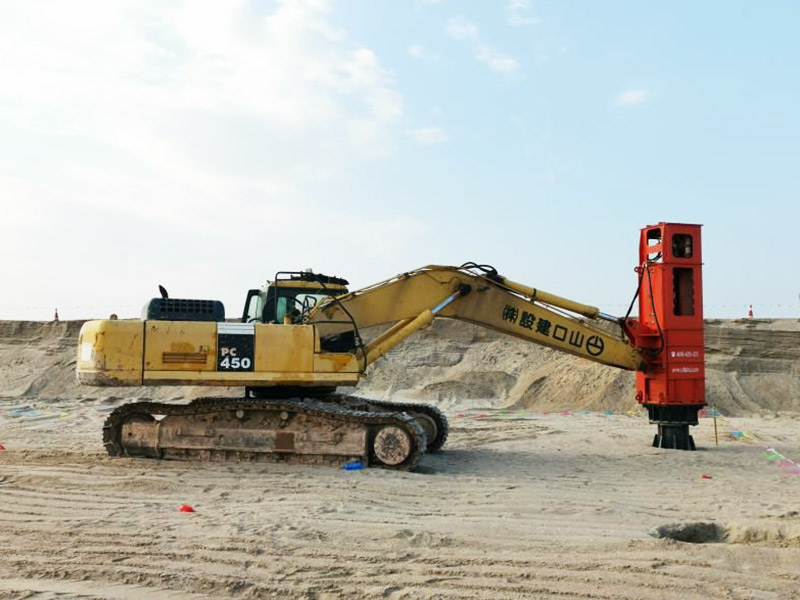
The energy and deflection of the soil is monitored and recorded at each location, which allows the geotechnical engineer to determine when effective treatment is complete. It also enables the engineer to identify weak zones (red dots) or debris zones throughout the pad so that any remedial actions that may be required can be minimized resulting in cost savings.
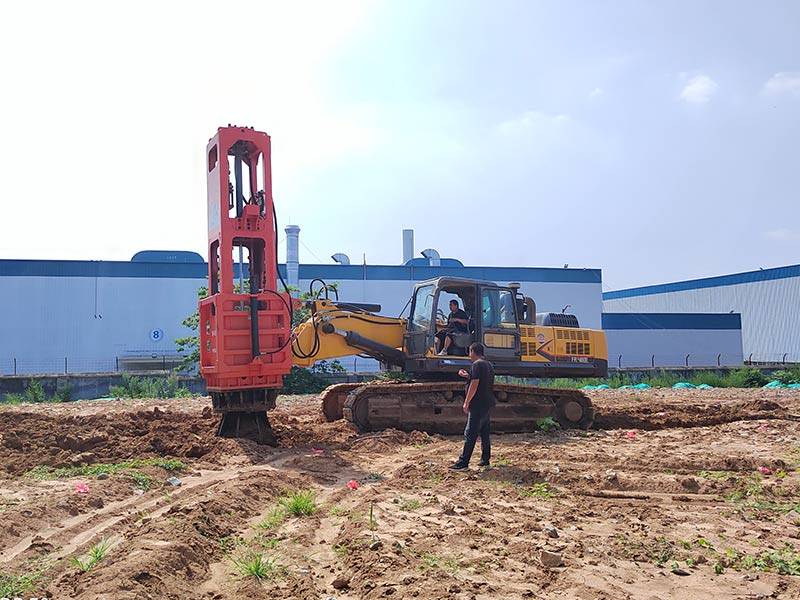
Control: the machine is accurately controlled from the excavator cab and the degree of compaction is electronically monitored,
Safety: the impact foot is in contact with the ground at all times and eliminates the risk of flying debris. Unlike conventional dynamic compaction, other activities can take place in close proximity,
Quality assurance: the impact energy and soil deflection are recorded by an on-board computer for presentation of compaction data to site managers. Results can verify work done to the client. The data can also highlight weak zones where extra fill is required, or zones where underground obstructions were present (eg. previously hidden old foundations),
Mobilisation: the RIC units are mounted on CAT 45 ton and CAT 85 ton excavators and can be mobilised within minutes of arrival on site,
Speed & cost: due to the fast ground coverage and the compaction efficiency, RIC generates a significant cost and time saving over conventional dynamic compaction methods with up to 75% cost and 100% time savings.
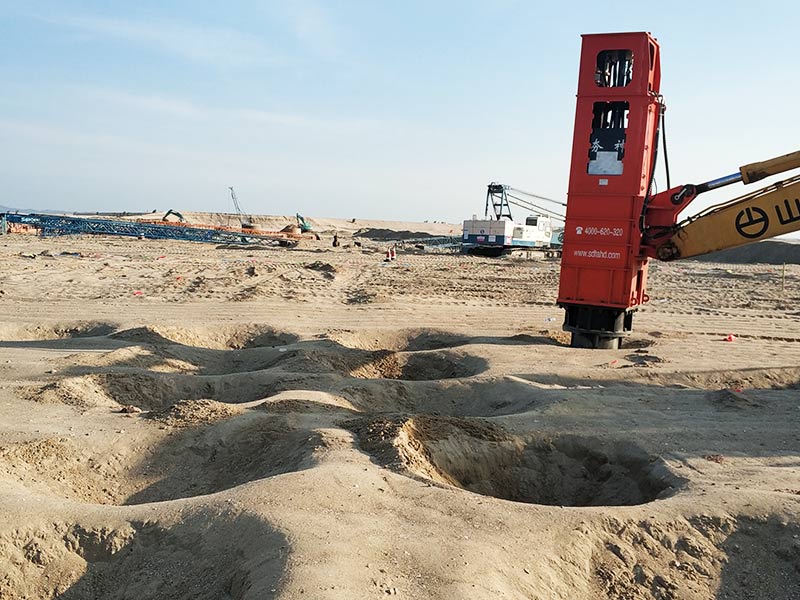
The Rapid Impact Compaction for the soil improvement uses a hydraulic hammer mounted on an excavator. The hammer with a weight ranging from 5 up to 12 tons is dropped freely from a height of 1.2 m on a large circular foot. Impacts repeated at a rate ranging from 40 up to 60 blows per minute plunge the steel foot creating a crater.
The control system installed in the operator’s cab allows for controlling the compaction process and recording the parameters such as impact energy or foot penetration. It can also be used to change the height from which the hammer is dropped.
The compaction in the RIC technology is usually preceded by creating a test plot where the compaction is performed for various spacing and rates of blows. Then, the local compaction of the improved soil is tested and the optimal grid spacing and the number of blows per one point is determined. Depending on the soils, the number of blows varies between 10 and 40 per one point.
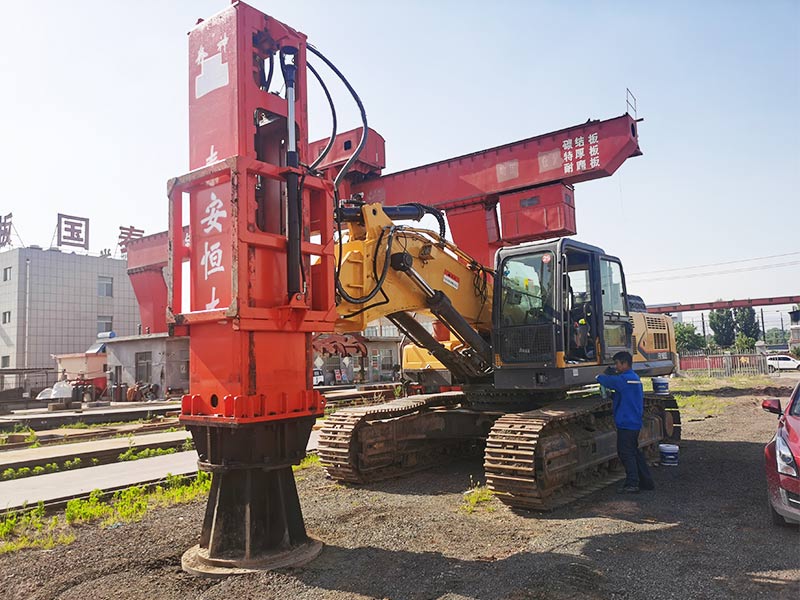
The Rapid Impact Compaction technology works very well for all kinds of non-cohesive soils, especially for the compaction of gravels and sands. It can also be used on reclaimed areas where anthropogenic soils and uncompacted fills occur.
Most often, the RIC technology is used for the construction of enclosed buildings: under the foundation slabs/floors of industrial and commercial halls and under heavy surfaces of warehouses, tanks; for the construction of infrastructure: all types of roads and highways, under the road and rail embankments and often as the improvement of the base for parking lots and airport runways. A great advantage of the RIC method is its mobility and relatively small size of the equipment unit which allows for carrying out the works in areas with difficult access.
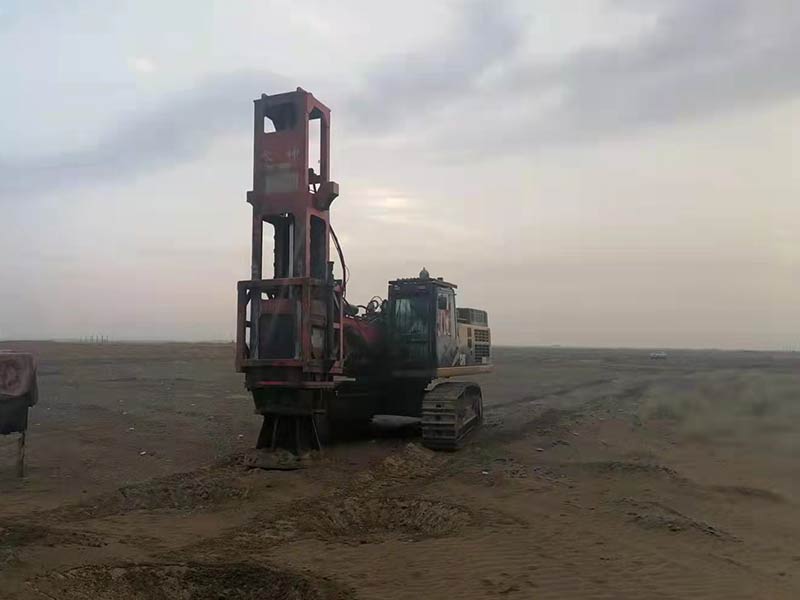
Rapid Impact Compaction is a shallow ground improvement and densification technique. This method densifies shallow, granular soils, which repeatedly strike an impact plate on the ground surface using a hydraulic hammer. The energy is transferred to the underlying loose soils and regroups the particles into a denser formation. The impact locations are located on a grid pattern and the spacing of those locations is calculated by the subsurface conditions and foundation loading and geometry.
- 2022-08-13Rapid impact compaction (RIC) - China manufacturer
- 2023-02-14Where do we use rapid impact compaction? - HENGDA RIC
- 2023-01-19What does it mean to have 95% compaction? HENGDA RIC
- 2022-08-27What is a rapid impact compaction? What is the construction method of rapid impact compactor?
- 2022-08-13Rapid Impact Compaction History In China - RIC 夯神
- 2022-08-15Construction specification for rapid impact compaction treatment of foundations
- 2023-01-29What does MDD stand for in compaction?
- 2022-11-02Does rapid impact compactors treat subgrade? What are the hazards of subgrade settlement?
- 2023-01-19Rapid impact compaction UK - HENGDA RIC
- 2022-09-06What is deep dynamic compaction? RIC manufacturers share
- 2022-08-15Rapid impact compactor at the construction site of Jazan Airport in Saudi Arabia
- 2022-08-15What is Rapid Hydraulic Compactor? - Rapid Hydraulic Compactor China Supplier
- 2022-09-28Rapid impact compaction under construction at Dubai Airport in UAE
- 2022-08-15HC36 Rapid Impact Compaction Equipment in Jiangxi Highway Construction in China
- 2022-08-15What is rapid impact compaction method? - Rapid impact compaction manufacturer
- 2022-08-15Rapid impact compactor under construction at Xiamen Airport in China
- 2022-08-15Rapid impact compaction (ric) method commonly used for
- 2022-08-15Rapid impact compaction in China's Guangdong high-speed construction
-
Rapid Impact Compaction equipment manufacturer-Rapid Impact Compaction debugging equipment
Rapid impact compactors have two compaction forms in practic...
-
Rapid Impact Compaction machine tamping depth - how many hammers for Rapid Impact Compaction machine
Take the widely used rapid impact compaction machine as an e...
-
Rapid Impact Compaction Operation Video Daquan-Rapid Impact Compactor Operation Video Tutorial
Rapid impact compaction has remarkable effect in foundation ...
- Hengda Machinery Co., Ltd
How much is the price of rapid impact compaction, model parameters, etc.


